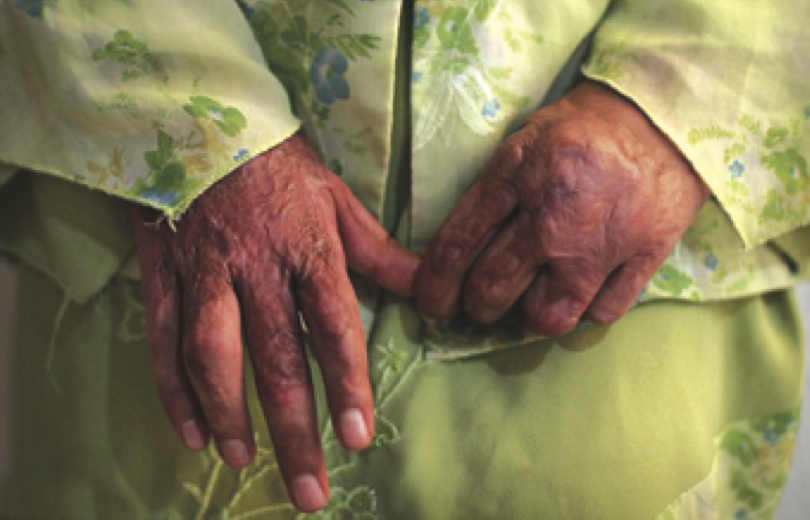
Mashid Rezai, now 36 years old, was just 11 when she was told she must become an older man’s second wife in Arak. She soon doused herself with gasoline to commit suicide and end her misery.
She survived that ordeal, but remains terribly scarred and will not permit a photograph to be taken of her face. She now lives in London. She fled her home in Iran to escape her father, who, she says, beat her even when she was hospitalized for her burns.
“Yes, I resent the people who didn’t help me,” Mashid last week told London’s Daily Mail, which ran a lengthy story about her. “The people who should have loved me did not protect me. They hurt me for life.”
Growing up in a remote village near the city of Arak, Mashid says her childhood was a relatively happy one although she, her mother and her three brothers were all terrified of the family patriarch.
“My mother was my father’s fourth wife,” she said. “He didn’t have children with his other wives. My mother told me that all three of his previous wives ran away because he beat them.”
And his busy fists weren’t just directed at his wife. “I remember once he tied my hands and feet with rope to a piece of wood and he and my mother beat me with another piece of wood,” she recalled. “They were angry with me because I had gone to the gate at the front of our house to watch a wedding procession and they did not like the families holding the wedding.”
Among her childhood friends was a girl named Zeinab. When Zeinab was just nine years old, she was asked for by a much older man.
“She was very beautiful and tall,” remembers Mashid, her voice cracking slightly. Zeinab was desperate to escape the marriage. “She burnt herself,” whispers Mashid. ”And she died.”
Less than a year later, Mashid’s father announced that she had been found a husband, a man a quarter century older than Zeinab. “My mother came to me at home and told me that the next afternoon a man would come and ask me for my hand in marriage,” she relates. “I asked her who it was and she told me the name of a man who lived in our village, who was married and had two children. I was only 11 years old and he was 35.”
Mashid was distraught. “I was crying. I told my mother he already had a wife and children. I told her I wanted to be a teacher, because I loved my teacher. But she insisted that I would get married to this man.”
The girl ran to her teacher, hoping for help, but was told nothing could be done. Mashid then ran to hide in the mountains but, fearful of being eaten by a wolf, returned home and hid in an outbuilding. “My parents found me and assumed that because I had returned home I was agreeing to the wedding,” she says.
Mashid ran into the kitchen. “I poured some paraffin on my skirt and I lit a match. My skirt caught fire. When I saw the fire, it was intense and very real. I regretted it. I tried to put the fire out with my hands. I tried to get out, but I had shut the door and it was difficult. I was panicking. The flames were raging and burning my face.
“I could see flames in my hair. I managed to get out into the courtyard. A neighbor was on the flat roof next door. He saw me and jumped down. I don’t know what happened after that.”
Mashid spent three months unconscious in a hospital in Arak, although even that wasn’t enough to spare her from the wrath of her father who was furious that his plans had been foiled and fearful for the family honor. “My father beat me for what I had done while I was at the hospital. Also, once I wet myself and my mother punched me in the face. They were so angry with me.”
When Mashid left the hospital, it was to return to her parents’ house after her former fiance rejected her as “dirty” and “ugly” from her disfigurement. At home, things went from bad to worse.
“My father was very aggressive. He told me I shamed the family and he was embarrassed because of how I looked. I overheard my father saying he wanted me to be taken to a hospital and killed with an injection.”
By then aged 13, Mashid stole some money from her parents and escaped to Tehran where she went straight to a hospital. A plastic surgeon took pity on her, eventually helping her escape from Iran and her father.
Now living in London, Mashid is trying to move on with her life, helped by the Iranian and Kurdish Women’s Rights Organization.
She hasn’t spoken to her family in Iran for two decades. ‘It was dangerous for me to stay in Iran. As a burnt, scarred woman, I was vilified. People attacked me. They insulted me, pulled at my clothing and children threw stones at me. I was always scared. I had to run away.”
“I was so surprised when I first arrived [in London] because people did not point at me or throw stones at me,” she told the Daily Mail. “It was such a relief.”
‘She said, “I want to study, which I didn’t have the chance to before. Then I want to help girls and women at risk of early and forced marriage, so they don’t end up like me.”
